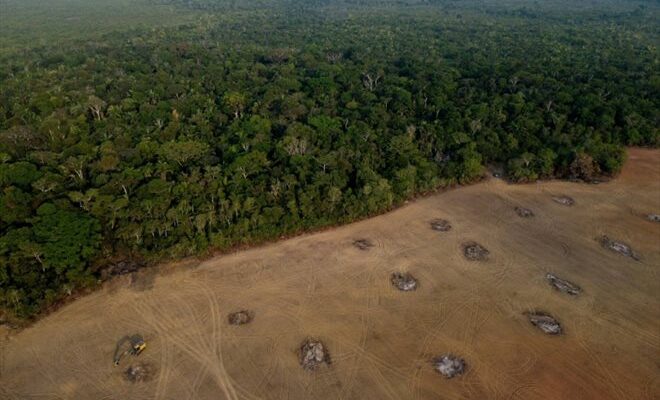Aerial view of a deforested area in Manicoré, September 22, 2022 in the Amazon (AFP/Archives/MICHAEL DANTAS)
Chocolate, coffee, wood or even rubber: importers wishing to sell these products in the European Union will now have to ensure that they are not from deforestation, according to a text adopted on Wednesday by the European Parliament.
This regulation, voted by a very large majority, aims to slow down the disappearance of forests on the other side of the world and, in doing so, to fight against climate change and preserve biodiversity.
It was approved the day after the adoption in the European Parliament of the EU’s ambitious climate plan, including the vast reform of its carbon market and the “carbon tax” at the borders to green its imports.
With this new text, the import into the EU of cocoa, coffee, palm oil, soya, wood, rubber, charcoal or beef will be prohibited if these products come from land deforested after December 2020.
Companies will also have to ensure that they have been produced with respect for human rights and the rights of indigenous peoples.

The main factors of deforestation (AFP/Archives/Sabrina BLANCHARD)
At the origin of 16% of global deforestation through its imports (mainly soy and palm oil, 2017 figures), the EU is the second destroyer of tropical forests behind China, according to the WWF.
It is the “first law in the world that will put an end to imported deforestation” welcomed MEP Pascal Canfin (Renew, liberals).
“All the opinion studies show that Europeans do not want to contribute to deforestation but they had no possibility of knowing, when they have a cup of coffee in the morning or a cup of chocolate that in fact they are complicit in imported deforestation,” he said during the proceedings on Monday evening.
– “Flaws” –
Greenpeace has nuanced the scope of the text by seeing it as “only a first step”. For the NGO, this regulation has “flaws”, for example by excluding ecosystems such as the savannah and by failing to target European banks which finance projects that destroy forests.

Aerial view of an oil palm plantation (d) in March 2018 in Indonesia (AFP/Archives/JANUAR)
For MEP Marie Toussaint (Greens), it is “essential that this text be extended in order to have an impact on fragile ecosystems such as mangroves, to include other products such as corn or to integrate the financial actors who finance many projects leading to deforestation”.
Three revisions of the text are planned. They will eventually allow other areas and other products to be included.
“The EU Regulation on non-deforestation products is very promising, but its effectiveness will depend on its strict implementation by each EU Member State and on the tangible support that the EU will offer to trading partners to compliance,” said Luciana Téllez Chávez, environmental researcher for the NGO Juman Rights watch.
The text’s rapporteur, Christophe Hansen (EPP, right), acknowledged this: the text involves a certain “administrative burden” and it is essential that small producers can benefit from “technical and financial assistance”.

Aerial view of a deforested area in Humaita, September 15, 2022 in the Amazon (AFP/Archives/MICHAEL DANTAS)
The Commission will classify countries as low or high risk within 18 months of the legislation coming into force. Products from low-risk countries will be subject to a simplified procedure, while controls will be reinforced in high-risk countries.
Companies will need to provide information such as geolocation coordinates to determine the exact place of production.
Checks will also be carried out through satellite monitoring tools and DNA analysis.
© 2023 AFP
Did you like this article ? Share it with your friends with the buttons below.




